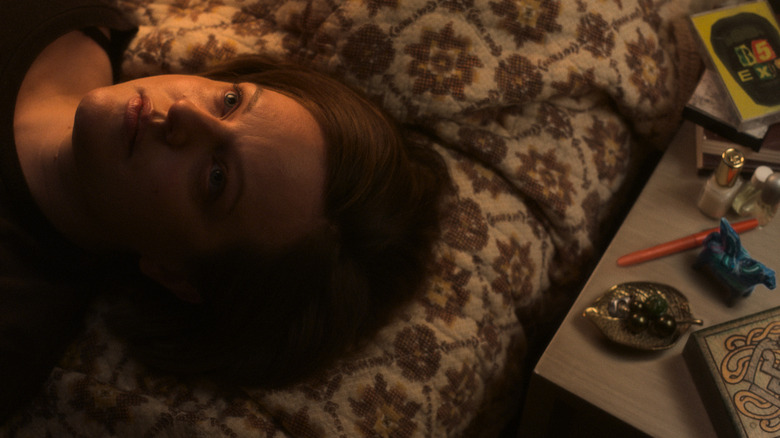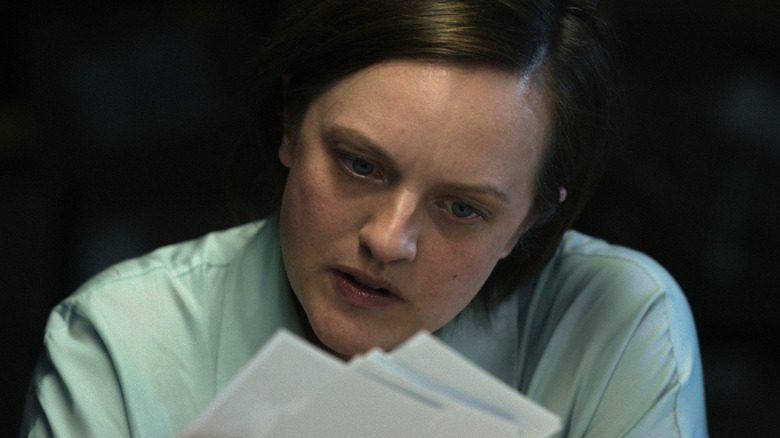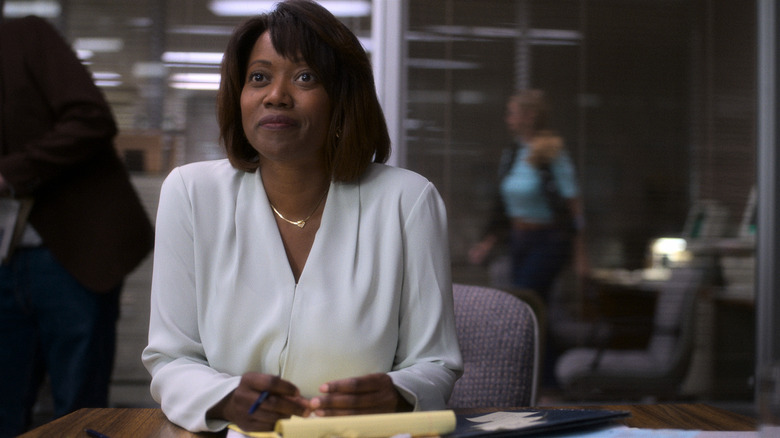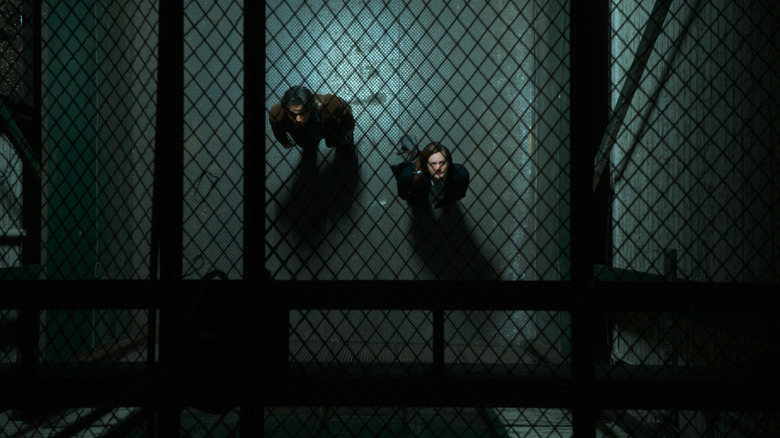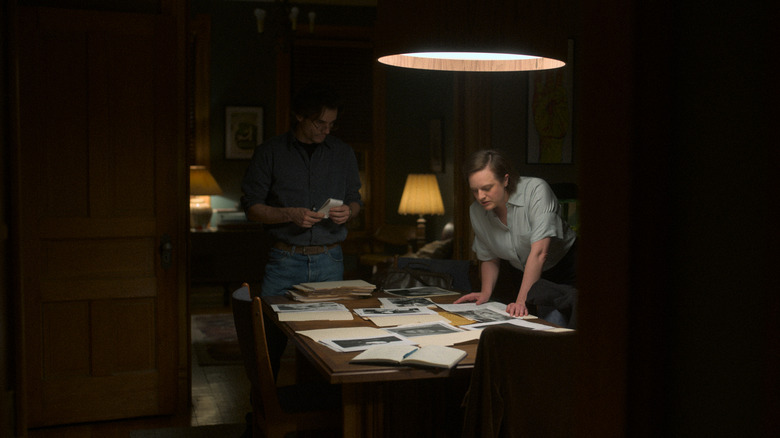Shining Girls Showrunner Silka Luisa Wants To Keep You Guessing [Interview]
Murder mystery shows have been a staple of television for decades, but since the true crime boom, it feels like there has been a tidal wave of shows about traumatized detectives or reporters who are desperately trying to stop an active serial killer. On paper, the intriguing new Apple TV+ series "Shining Girls" seems like it might fall into that same category. But there's something different about this show — deeper mysteries about its characters that demand answers. Kirby (Elisabeth Moss), the traumatized reporter on the hunt for the man who assaulted her, is experiencing bizarre, unexplainable shifts in reality. The creepy killer (Jamie Bell) is finding new victims, but his appearance doesn't change over time. What the heck is going on?
Silka Luisa, adapting this story from Lauren Beukes' 2013 novel, leaves those questions lingering, immersing the audience into Kirby's unstable perspective. For a significant portion of the show's eight-episode season, we're desperately trying to put the pieces together and figure out the bigger picture. But Luisa, in her first time serving as a showrunner, is confident enough in the performances and the mystery to withhold the answers much longer than you'd expect. It's a bold choice, but her confidence was not misplaced; even though I had no clue what was happening for the first half of the season, there's something addictive about this world and its characters that kept me coming back.
I had the opportunity to speak with Luisa before the show's premiere, and I asked her about that tactic of doling out information at her own pace, working with Elisabeth Moss, how she approached the idea of Easter eggs in the series, and more.
"You have to structure in the mythology like its own mystery"
It is clear early on in the series that something odd is happening in terms of the shifting reality around the lead character. As an audience member, I've been trained to expect that storytellers are going to provide a set of rules that explain how their worlds work. But in this show, the rules are held back for a long time and we're left wondering what exactly is going on. So I was curious if you could talk about your approach to withholding those rules and doling out information the way you did over the course of the season.
Well, I am also a huge genre person, and as a viewer, we are now trained to look for that mythology and to look for those specific rules, just like you were saying. For me, because you know who [Jamie Bell's character] Harper is from the very beginning, that is not the mystery that you're tracking. The mystery that you're tracking is: Why is Kirby's reality changing, and how is it connected to these murders? Because of that, you have to structure in the mythology like its own mystery. And a big part of breaking the season was really understanding, "Okay, how much per each episode are we going to figure out? How long can you hold it where it's exciting? Where does it become confusing?" Navigating that clarity was definitely one of the challenges of the show.
Did you play with that in editing once you had filmed everything?
Yeah. And what's really interesting in the editing process is that, you can do it with just staying in a shot longer, you can do it with cutting two lines of dialogue out and you completely — you can calibrate it in such a fine-tuned way that it becomes a huge part of the editing, which is just "How much are you going to know?" It's different for every audience member. There's certain people who love to try and figure it out and anticipate. There's others who just want to be along for the ride. I think we try to strike a balance where, for both kinds of viewers, it's still going to be a fun show to watch.
It was very effective because my wife and I both watched the show together and we were totally hooked despite having no clue what exactly was going on with this character.
That makes me happy to hear, thank you.
"We spoke to a lot of reporters from the Chicago Sun-Times in the '90s"
So did you watch anything beforehand, either for inspiration or maybe for noting things that you wanted to avoid in a genre story like this?
Whenever I start a project, I try not to watch other film and TV as references. I used a lot more research, so I spent a lot of time reading autobiographies from reporters. We spoke to a lot of reporters from the Chicago Sun-Times in the '90s. I did a lot of research on Chicago to try and find interesting subcultures to set scenes in. So for me, the initial process, the inspiration process, usually comes from nonfiction, documentaries, things like that.
Should people be looking in the deep background of a couple of these episodes to see if there's a Roger Ebert cameo?
Oh, no. (laughs) I wish. I wish.
I wondered if you might have thrown something like that in as an Easter egg.
No, I wish. The Chicago Sun-Times has so many really incredible columnists and reporters.
How did you approach thinking about Easter eggs?
Well, the whole show is about details, so it's about reality shifting. You're in different time periods. And because it's also a murder mystery, it feels like those specific clues, small clues, have so much weight to them. The hope is that for viewers that enjoy that kind of process, there will be a lot there for them.
"By the time I got to set, I'd already been working on it for three years"
Tell me about working with Elisabeth Moss on this, because she's not just the star of the show, she's also a director and an executive producer as well.
So she came on very early on in the process. I had written the pilot and she was actually the first actress that we went out to, because I can't imagine anyone else but her playing Kirby. So what was fantastic about that was that she could actually be there as we were writing the season, and she was a part of that development process. So as I was building out Kirby's character, we had a back and forth dialogue about just what her arc was going to be over the season and how to calibrate that, which really helped when we got to set — both as a producer and then as a director, she really understood the show. She just became a partner even throughout all of production because it felt like we were just on the same page about what our intentions and what the ambitions were for "Shining Girls."
When somebody of that caliber gets involved with the show, I imagine the list of potential collaborators grows exponentially because a lot of people want to work with her. How did you decide about who you wanted to direct this series?
I had been a huge fan of Michelle [MacLaren]. I mean obviously, "Breaking Bad," "Game of Thrones" — she's directed all of my favorite shows and then my favorite episodes within those shows, so we were just so fortunate to have her. I think she really set the tone for the rest of the season in the sense that she's able to create this constant tension while having the scenes breathe, where you're getting to spend time with the characters and you get to know them. Finding the right pacing for that is actually really challenging, and she set a template that both Daina and Lizzie were able to follow in her path.
This is the first time that you were a showrunner for a TV series. You can prepare all you want for something like that, but was there anything about the job that ended up surprising you once you were actually doing it day to day?
There's definitely things as you do it for your first time that you're just not going to know until you do it. But one of the benefits of this being my first show was that by the time I got to set, I'd already been working on it for three years. So it felt like the show was so inside my bones that I could answer any question about it. I could explain to people what the vision was. I think at the end of the day, whatever you don't know about the practicalities of the process, as long as you know what show you're making and you're able to articulate that, that's the most important function of a showrunner.
It seemed like you're in good hands too. I mean, your collaborators are pretty tough notch on this one.
(laughs) That also really helps, hiring incredibly talented people that can carry you, yes.
"The experience of watching the show shouldn't feel heavy"
So are you going to be able to get Harrison Ford to come back for "Blade Runner 2099?"
I cannot answer that question, you know that. (laughs)
What can you tell me about your take for that show? Anything?
I can't tell you about the take. I can only tell you that we started the writers' room three weeks ago and it's very, very — I'm a huge "Blade Runner" fan, of course, like so many people, and it is very seminal to all of my decisions to be a storyteller, so it's very exciting.
Understood. I had to try.
I know. You threw it in there real casual, like I wasn't going to pick up on it.
(laughs) Thinking back on your experience with "Shining Girls," is there an aspect of the show that you are the most proud of?
The book meant so much to me. It just felt like [Lauren Beukes] had done something so incredibly elegant, and the themes and the way she talked about them were so delicate. I'm proud that, I believe, in my opinion, at the end of the day, we've been able to accomplish that. We changed some structure, and the characters might have shifted, but I think the themes that she talks about in the book, we've been able to present [in an accurate way], hopefully.
When I spoke with Michelle earlier, she talked about how the shifting reality part of the show is a metaphor for the aftermath of trauma. Did you have a guiding light when it came to dealing with something so heavy?
I think even though it is dealing with something heavy, my personal taste is that the experience of watching the show shouldn't feel heavy. I think because of the genre elements, it makes it palatable. It makes you want to return to it every single week, because you have sci-fi, because you have mystery, it doesn't feel like homework to talk about these harder themes.
The first three episodes of "Shining Girls" are now available on Apple TV+.
